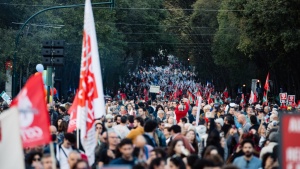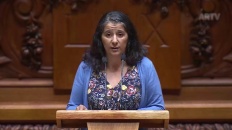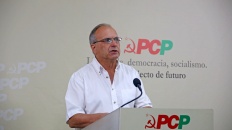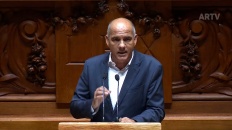The PCP's opposition to this government bill is already well known, but how did you view the Prime Minister's statement about the possibility of a general strike, calling on trade unions to act responsibly and saying that workers' interests should not be captured by party interests?
Look, it takes a lot of nerve. A government and a prime minister whose goal is to increase precariousness beyond what already exists, and which is already affecting thousands of people, by completely deregulating working hours, making workers work even longer hours, more time and more hours without pay, a government that wants to make unfair dismissal possible, wants to attack rights, wants to destroy all prospects for the future of young people, forcing them to work for the rest of their lives in precarious conditions and on endless fixed-term contracts. It takes a lot of nerve to have this kind of talk. This is a great demonstration, a great demonstration of what we have been saying. Politics and political choices must serve those who make the country work, those who create wealth. All these workers, particularly the younger ones and women, who are also the target of this brutal attack by the labour package, namely with attacks on parenthood and maternity. This is what needs to be resolved once and for all. Everything else is just to entertain us and, I would say, to keep us talking. We are not falling for this. This labour package must be rejected, defeated and withdrawn. What is needed is not more precariousness or more deregulation of working hours. What is needed is stability, higher wages, more time to live and more time to be with the children and particularly care for them.
Yesterday, Montenegro also criticised the parties that are actually associated with these demonstrations and the trade unions for being captured by parties such as the PCP and Bloco, which are participating in these demonstrations. Do you think these words are also sensible at a time when social dialogue negotiations are underway?
We have a government, a government made up of four parties – PSD, CDS, Chega, Iniciativa Liberal – that is completely captured and in the hands of large economic groups. Look at the State Budget, look at the tax benefits, look at the cut in taxes on profits, look at all of that and we will see who is captured by whom. It is the government and the governing parties that are captured by big business interests. These people who make the country work, these people who make the economy work, these people who create wealth, are not captured by anything except their strength, their determination and their desire to have a better life and the right to a better life. That is what they are here to do: to say no to the labour package, to say no to precariousness, to say no to the deregulation of working hours, to say no to unfair dismissals, to say yes to respect, dignity, wages, stability and the better life to which they are entitled. That is the big issue.
Will this be the first general strike since 2013?
Look, this great show of strength, following previous ones, with great determination, great participation, a great desire to stop the labour package, but also to pave the way that is needed, which is the that of wages and stability, this great strength will have to continue. Now, if it is to continue, it is up to the workers and their representative bodies to define what that continuity will be, and we will wait and see what happens.
I would like to ask you if you think these times are comparable to the times of the troika?
Times do not repeat themselves, but I would say that there are hints of it. It smells like the troika. It smells like the troika, but not just now. It smells like the troika in the budget, it smells like the troika in the dismantling of the National Health Service, it smells like the troika in education and tuition fees. It smells like the troika in labour law. Oh yes, it smells.








